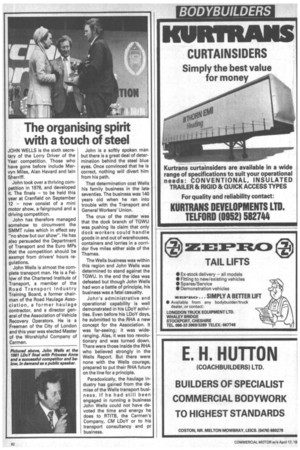The organising spirit with a touch of steel
Page 52

If you've noticed an error in this article please click here to report it so we can fix it.
JOHN WELLS is the sixth secretary of the Lorry Driver of the Year competition. Those who have gone before include Mervyn Miles, Alan Havard and lain Sherriff.
John took over a thriving competition in 1978, and developed it. The finals — to be held this year at Cranfield on September 12 — now consist of a mini motor show, a fairground and a driving competition.
John has therefore managed somehow to circumvent the SMMT rules which in effect say "no show but our show". He has also persuaded the Department of Transport and the Euro MPs that the competition should be exempt from drivers' hours regulations.
John Wells is almost the complete transport man. He is a Fellow of the Chartered Institute of Transport, a member of the Road Transport Industry Training Board, a former chairman of the Road Haulage Association, a former haulage contractor, and a director general of the Association of Vehicle Recovery Operators. He is a Freeman of the City of London and this year was elected Master of the Worshipful Company of Carmen. John is a softly spoken man but there is a great deal of determination behind the steel blue eyes. Once convinced that he is correct, nothing will divert him from his path.
That determination cost Wells his family business in the late seventies. The business was 140 years old when he ran into trouble with the Transport and General Workers' Union.
The crux of the matter was that the dock branch of TGWU was pushing its claim that only dock workers could handle goods in and out of warehouses, containers and lorries in a corridor five miles either side of the Thames.
The Wells business was within this region and John Wells was determined to stand against the TGWU. In the end the idea was defeated but though John Wells had won a battle of principle, his business was a fatal casualty.
John's administrative and operational capability is well demonstrated in his LDoY activities. Even before his LDoY days, he submitted to the RHA a new concept for the Association. It was far-seeing; it was wideranging. Alas, it was too revolutionary and was turned down. There were those inside the RHA who believed strongly in the Wells Report. But there were none with the Wells courage, prepared to put their RHA future on the line for a principle.
Paradoxically, the haulage industry has gained from the demise of the Wells transport business. If he had still been engaged in running a business John Wells could not have devoted the time and energy he does to RTITB, the Carmen's Company, CM LDoY or to his transport consultancy and pr business.




































































